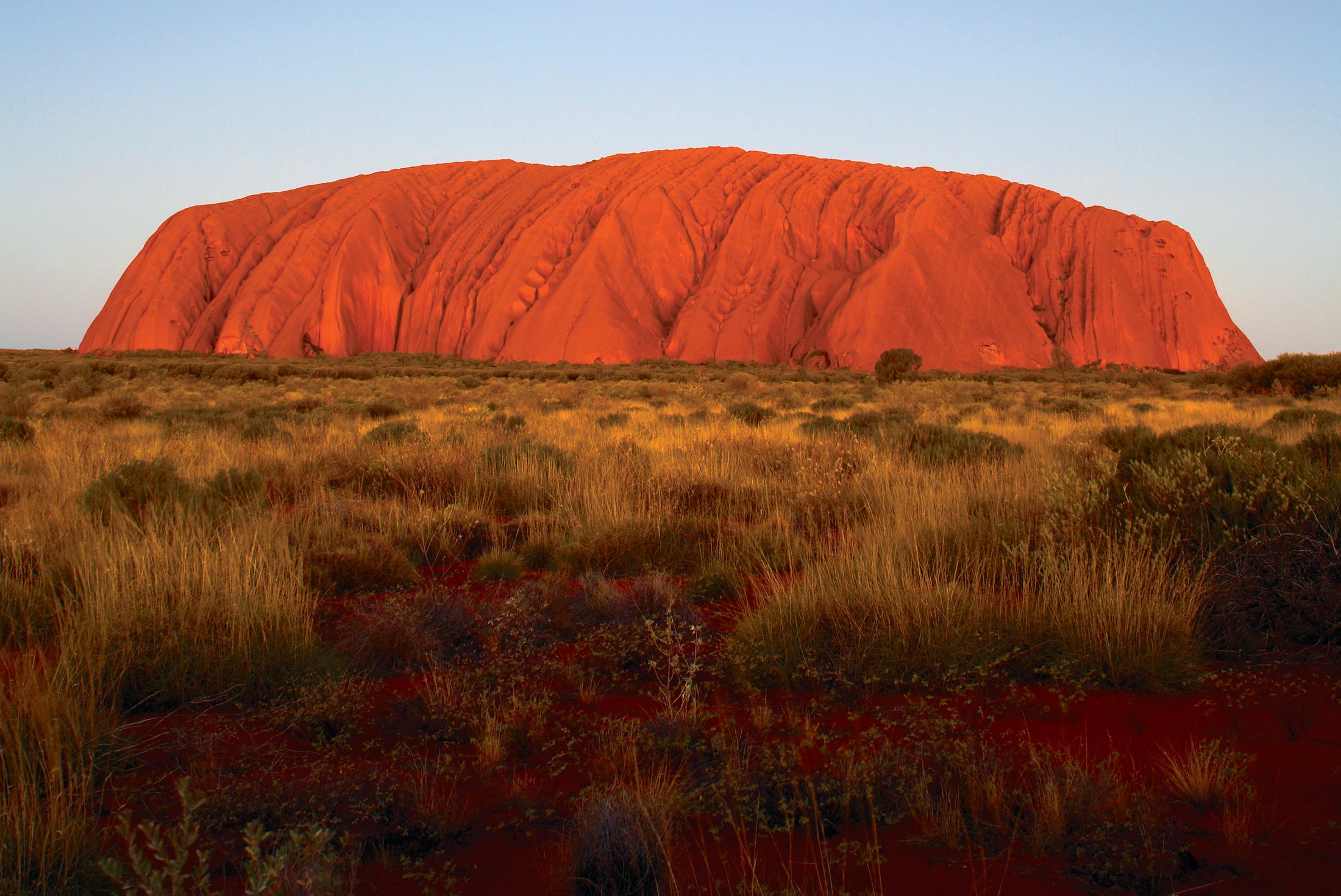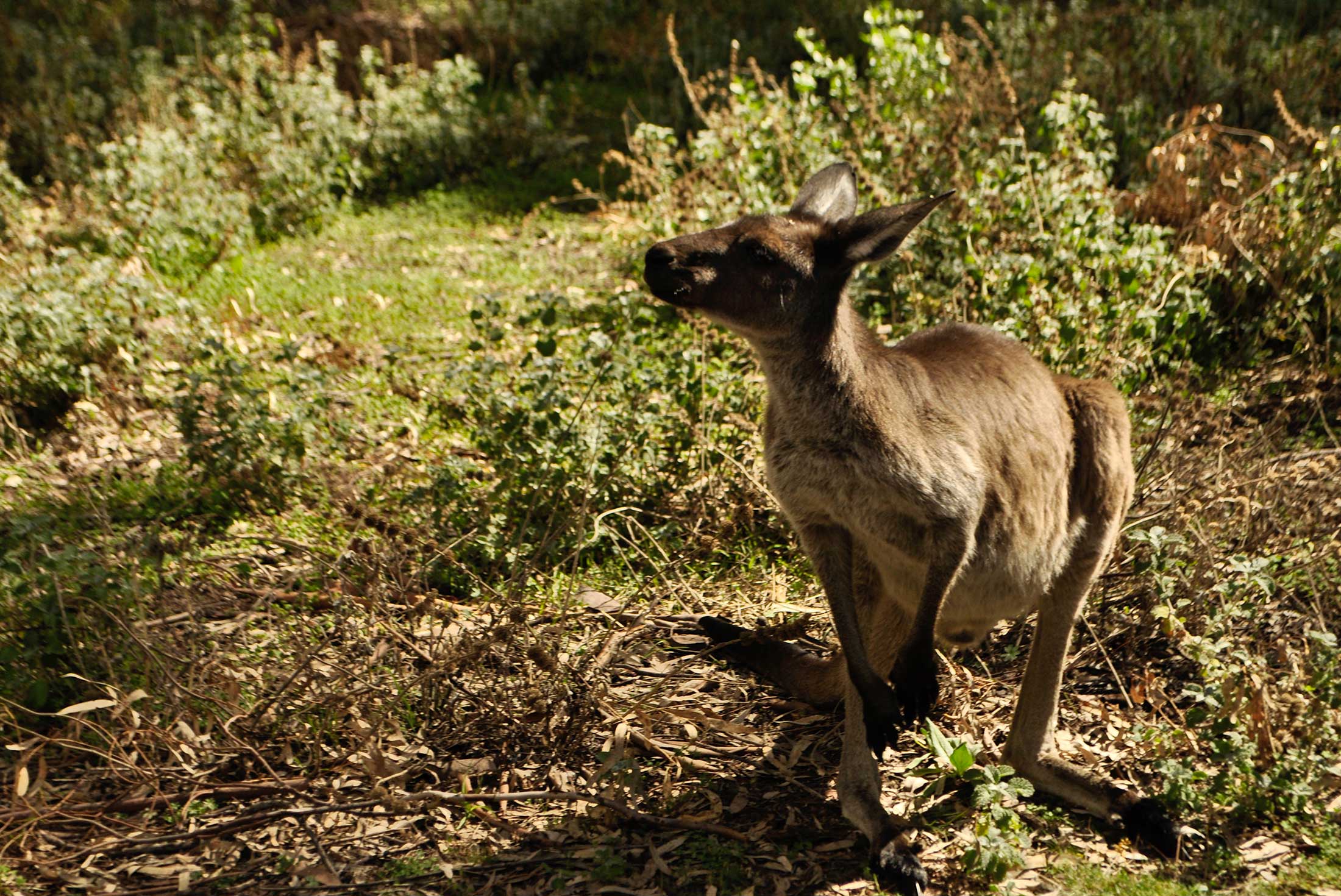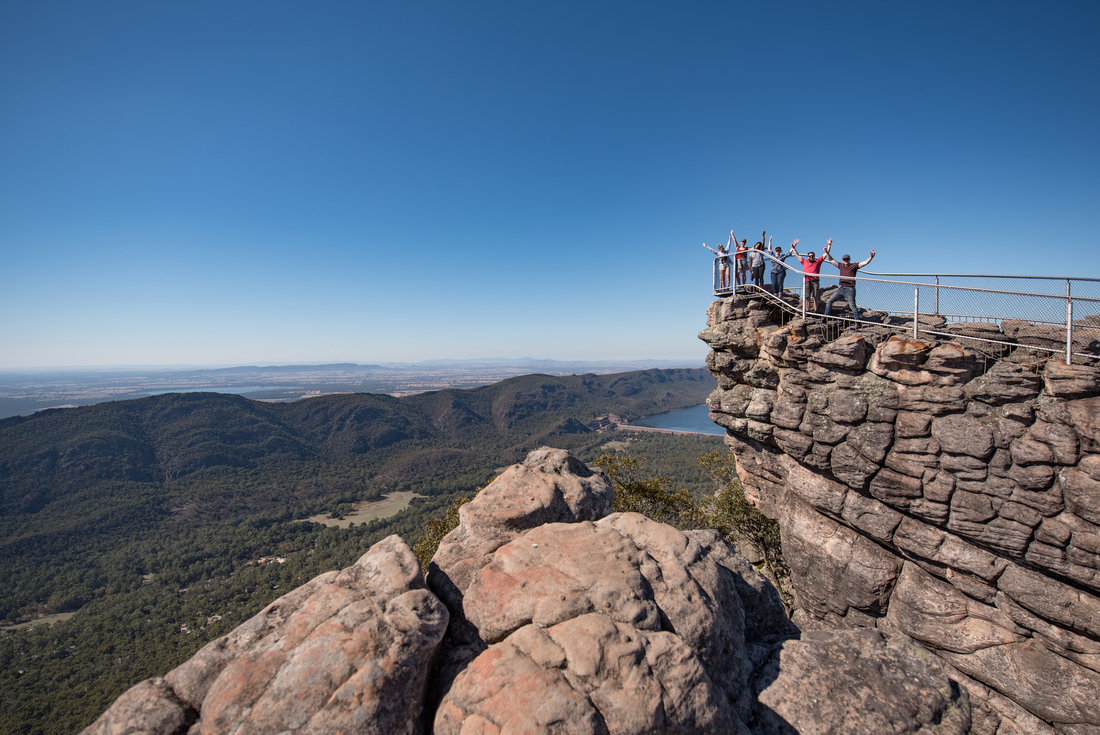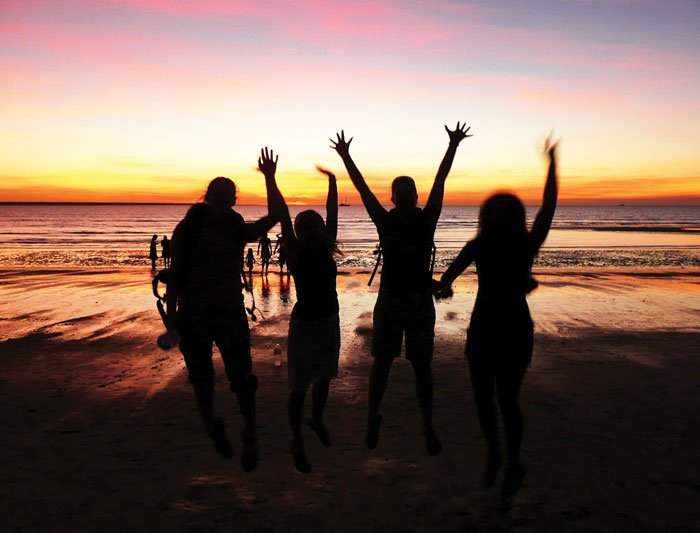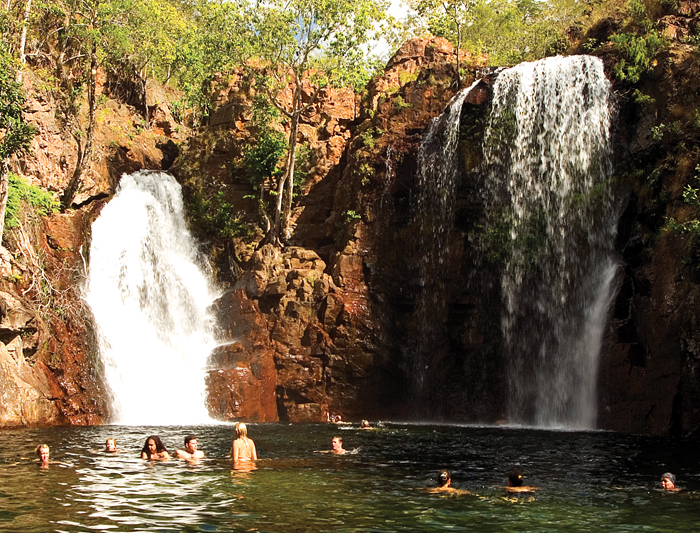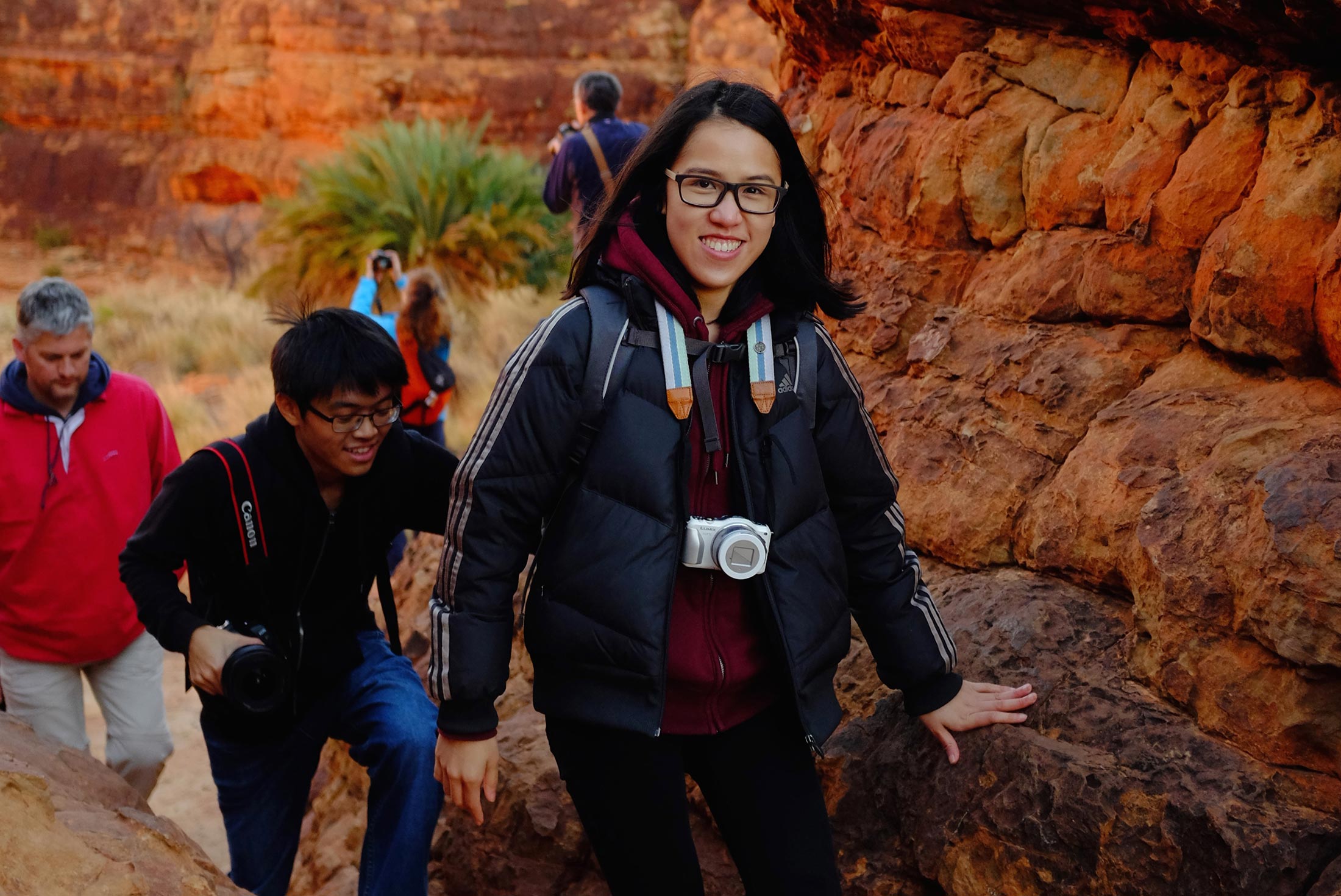- Travel along Australia’s most acclaimed stretch of coastline with a scenic drive on the Great Ocean Road. This is one trip where you definitely want to call shotgun on a window seat.
- Take a one-night pitstop in Halls Gap to discover the rugged beauty of the Grampians National Park. Go hiking up to the Pinnacles lookout, and marvel at the stunning MacKenzie Falls.
- Immerse yourself in First Nations cultures with experiences including witnessing cave paintings near Mutitjulu Waterhole at the base of Uluru and viewing Aboriginal rock art at Yourambulla Caves.
- See the best of Australia’s iconic Red Centre on guided walks around Uluru, Kings Canyon and the ancient red domes of Kata Tjuta.
- Learn about the ancient culture and traditions of The First Peoples of Australia during an interactive experience in Katherine, and discover the historic and natural wonders of Kakadu National Park.
22 Jun 2020
Melbourne to Darwin Overland
POMAD
Validity: 01 Apr 2020 to 31 Mar 2021
Thought you knew what an epic Aussie road trip was? Well, think again. Crank the tunes and leave the big cities in your dust on the ultimate 17-day Outback adventure between Melbourne and Darwin. Discover the beauty of the Great Ocean Road coastline, check out the quirky opal mining town of Coober Pedy, witness the majestic Uluru at sunrise, gain an insight into the significance of First Nations cave paintings, rock art and connection to the land in Kata Tjuta and Katherine, and see some seriously spectacular vistas at the Grampians, the Flinders Ranges and Kakadu. With plenty of time to appreciate the natural beauty and learn a little bit more about the Traditional Owners of the land, let Australia’s southern interior, Red Centre and Top End lead the way.
Original
Explorer,Overland
private bus,plane,All Terrain vehicle
3
To get the most out of this trip you need to be prepared for walks of between 3-9 km on some days. This may be on rough ground and perhaps getting feet wet in rivers and creeks. From Oct to March in the Red Centre, West Coast, and South of Australia you will experience temperatures of over 35 degrees Celsius (and sometimes well into the 40’s) so be prepared to endure extra physical stress due to the heat at these times, especially while on walks. In the Top End of Australia (Kimberley and Kakadu) temperatures in the shoulder months of April, May and September, October humidity levels can be high and sometimes slightly uncomfortable. These extreme outside temperatures can also place stress on the air-conditioning units within our vehicles which can make travelling uncomfortable. Your tour guide will assist with regular breaks and information to assist in keeping well hydrated.
Athenaeum Theatre departing 07:15am
188 Collins Street
Melbourne
Melbourne
3000
AUSTRALIA
Central Darwin accommodation
Darwin CBD
Darwin
AUSTRALIA
1. This trip requires a sleeping bag 2. For the Kings Canyon Rim Walk it is a requirement that you have a minimum of 3 litres of water with you. Please consider bringing your own refillable water bottles. 3.The Top End & Kakadu portion of this trip has a strict luggage limit of 10 kg. Excess luggage can not be carried however, it can be stored at Darwin accommodation. 4. Tour commences in Melbourne on Day 1 at 7 am and finishes in Darwin on the last day at approximately 6 pm. Onward travel should be booked the following day (or late that night)
All group trips are accompanied by a group leader. In Australia your group leader is also your driver, taking you from start to finish in a specialised vehicle. The aim of the group leader is to take the hassle out of your travels and to help you have the best trip possible. Yor leader will provide information on the places you are travelling through, offer suggestions for things to do and see, organise the camp and cooking for camp or kitchen cooked meals (though passengers are required to help out) as well as recommend great local eating venues. They will also introduce you to our local friends along the way. While not being guides in the traditional sense you can expect them to have a broad general knowledge of the areas visited on the trip, including historical, environmental, cultural and social aspects. This trip is made of three smaller trips connected by a flight. You will be travelling with different Guides on each trip who are specialists in each region, and will not have an accompanying Guide during your flight.
REMOTE AREA TRAVEL: We carry a satellite phone on all of our remote/overland trips to be used by our leaders in the event of an emergency and for your safety. In addition, all of our leaders are First Aid trained and certified. HYDRATION: Daytime temperatures can be extreme from Oct to March with temperatures over 40 degrees Celsius. Please bring a large refillable water bottle. We strongly recommend the use of dehydration salts and sports drinks as a way to combat dehydration during times of extreme heat.
Wireless (wi-fi) is common across accommodation in Australia. Some properties may charge a fee for usage. Cafe's and pubs may have wi-fi for a fee, with those in tourist area's generally offering limited free useage. Shopping centre's, airports and other public spaces offer limited free wi-fi access. Travelling even a small distance from populated areas will see internet access stop. Many of our camps have little to no internet access (any access at all is expensive) being as remote as they are. Turn your phone off and enjoy the beauty of this part of the world. Australia’s main telecommunication companies all operate in towns in the NT, SA and VIC. Different networks will work in outback or regional area's. Pay phones (most are prepaid card only) are rarer than hen's teeth but can be found in most campsites we use. If you are spending longer in Australia, it might be a good idea to purchase a local SIM card for data and your mobile device. if you need to purchase a phone locally. look for Telstra's 'blue tick' phones with better coverage in rural areas. Guides are equipped with satellite phones for emergencies only
All travellers, except New Zealand citizens, must obtain a visa or travel authority before travelling to Australia. Failure to do so means you may not be allowed to board your flight to Australia. Most nationalities can obtain an Electronic Travel Authority via the internet before arrival. Please check the following website or with your relevant Australian visa issuing office for your nationalities requirements. http://www.eta.immi.gov.au/
Travel along Australia’s most acclaimed stretch of coastline with a scenic drive on the Great Ocean Road. This is one trip where you definitely want to call shotgun on a window seat.
Take a one-night pitstop in Halls Gap to discover the rugged beauty of the Grampians National Park. Go hiking up to the Pinnacles lookout, and marvel at the stunning MacKenzie Falls.
Immerse yourself in First Nations cultures with experiences including witnessing cave paintings near Mutitjulu Waterhole at the base of Uluru and viewing Aboriginal rock art at Yourambulla Caves.
See the best of Australia’s iconic Red Centre on guided walks around Uluru, Kings Canyon and the ancient red domes of Kata Tjuta.
Learn about the ancient culture and traditions of The First Peoples of Australia during an interactive experience in Katherine, and discover the historic and natural wonders of Kakadu National Park.
This trip covers the highlights of Australia's Great Ocean Road and Grampians, Flinders Ranges, and the Red Centre. You'll spend some nights of the trip sleeping in outback camping grounds. You'll also need to pitch in with preparing meals and cleaning. This is part of the experience of travelling in a group. This trip requires a moderate level of fitness as it involves a lot of walking, allowing you to truly enjoy the surrounding nature. Some hikes are longer and more challenging than others. Please bring sturdy, comfortable walking shoes and comfortable clothing. Temperatures in the Red Centre and Top End can be extreme. During the day the weather can be hot (and the Australian sun is strong) so please bring appropriate clothing, use sun protection and drink plenty of water. In the evenings temperatures really drop, so ensure you have base layers and warm clothing. On most days of the trip, you'll spend several hours driving through very sparse areas of desert. Crank up the tunes and sit back to enjoy landscapes that you would miss in any other form of travel. Group participation makes up a lot of this trip, so you'll be required to help with preparation of meals and cleaning up. These are the kind of tasks that bring a group closer together. The Top End portion of your adventure has a strict luggage limit of 10 kg. Excess luggage cannot be carried; however, it can be stored at the Darwin accommodation.
All travellers need to be in good physical health in order to participate fully on this trip. When selecting your trip please make sure you have read through the itinerary carefully and assess your ability to cope with our style of travel. Please note that if, in the opinion of our group leader or local guide, any traveller is unable to complete the itinerary without undue risk to themselves and/or the rest of the group, Intrepid Travel reserves the right to exclude them from all or part of a trip without refund. You should consult your doctor for up-to-date medical travel information or for any necessary vaccinations before departure. We recommend that you carry a first aid kit as well as any personal medical requirements as they may not easily be obtained at the locations on this trip. Please ensure that you are adequately prepared. Dengue, Murray Valley Encephalitis (MVE) and Ross River Fever occur in northern parts of Australia (the Northern Territory, Northern Queensland and northern Western Australia). All three viruses are transmitted by mosquitoes. There is no vaccination against them, but there are preventative measures that you can take such as wearing long clothing, using repellent and being indoors particularly around dusk and dawn. January 2009 saw an earlier than usual seasonal outbreak of dengue fever in northern Queensland, with over 600 confirmed cases in and around Cairns and Townsville. There have been 77 confirmed cases of Whitmore disease (melioidosis) in the Northern Territory, mainly in greater Darwin, but with cases reported in the Katherine and East Arnhem regions too. One case has occurred as far south as Tennant Creek. The risk of melioidosis will continue to be present as long as the rains continue. Those most at risk are those with underlying conditions that impair the immune system such as diabetes. Please visit the NT Department of Health and Families website – http://www.health.nt.gov.au - for more information.
DIETARY REQUIREMENTS: On most days, breakfast, lunch and dinner will be included. Our tours are activity and participation based. During your travels with us you will have the opportunity to assist with daily activities such as setting up camp, helping prepare meals and clearing dishes. None of this is difficult however many hands make light work and any assistance provided to crew is always much appreciated. Most people agree that this type of activity helps you feel like less of a tourist and more of an explorer. All food for this trip is purchased and packed prior to your group leaving on day one. After we’ve left town it can be very difficult to source special dietary requests. Travellers with special dietary requirements or food allergies are required to advise us at the time of booking. You may be asked to pay for any additional food if you have not advised us of any special dietary requirements. Due to the often remote nature of our trips, food is basic but plentiful and delicious. The below dietary needs can be easily catered for. Vegetarian Gluten Free Dairy Free (soy available ) Pork Free Please bring your own staples (nuts, bars, snacks) if you require a diet differing from the above. * Religious and more specific dietary requirements are generally unable to be catered for on these trips. NOTE: For those passengers commencing their trip in Yulara, lunch will not be provided on day one.
Please budget for additional meals and expenses while on your trip. Our suggestion is based on past traveller feedback but you may choose to spend more or less. The Australian Dollar (A$) is the currency of Australia. Credit and debit cards are readily accepted just about everywhere in Australia. Occasionally there may be a minimum spend for both in smaller shops. You can usually withdraw money from shops where EFTPOS is available. Automatic teller machines (ATMs) are common across Australia. ATM's may be limited in remote areas and your leader will advise you when to withdraw extra cash. Credit cards in Australia require a pin number rather than a signature and may have a small surcharge for purchases. Tipping is not expected but appreciated. EMERGENCY FUNDS: We try to plan for every eventuality, but there are still some things beyond our control. Please make sure you bring an extra USD500 for emergencies (e.g. natural disasters or civil unrest). Sometimes these things necessitate last minute changes to our itineraries, and we can’t guarantee there won’t be some extra costs involved.
What you need to bring will vary according to the trip style you have chosen, the countries you are visiting and when you are travelling. Generally speaking, we recommend you pack as lightly as possible and make sure that you are able to carry and lift your own luggage, and walk with it for short distances. Most travellers carry their luggage in a backpack, although an overnight bag with a shoulder strap would suffice if you travel lightly. Smaller bags or backpacks with wheels are convenient although we recommend your bag has carry straps. You'll also need a day pack/bag to carry water, camera, and jacket etc. when you’re exploring during the day. LUGGAGE LIMIT: Please keep your luggage to a minimum. Due to limited space and strictly enforced road laws regarding weight limits, Intrepid travellers can carry a maximum of 15 kg. One small soft-sided bag plus a day pack is essential. We recommend against bringing hard/externally framed suitcases as they are difficult to store and can damage equipment and other travellers' belongings. If your trip is beginning and ending at the same location, excess luggage can usually be stored at your arrival/departure hotel and can be collected after your trip. If your trip does not return to the same starting point we suggest you look at freighting your excess luggage. One option is with greyhound: http://www.greyhoundfreight.com.au/ WATER BOTTLE: Consider bringing your own water bottle to refill along the way. For the Kings Canyon Rim Walk it is a requirement that you have a minimum of 3 litres of water with you.The sale of bottled water contributes to an enormous environmental problem around the world. In addition to the water in bottles, the production of a 1 litre plastic bottle takes 2 litres of water and 200ml of oil. A large proportion end up in limited landfill or discarded in waterways and natural environments. SLEEPING BAG & MAT: Comfortable sleeping mats are provided when camping. If you are travelling on a Basix style trip please bring a travel pillow and sleeping bag or pre-purchase a sleeping bag from us. If you do not wish to keep your sleeping bag we will return them to our Operations Department, where they will be washed and donated to local Aboriginal and Torres Strait Islander communities. If you are travelling on an Original style trip all linen and bedding is provided, so no sleeping bag is required. Below are some ideas and helpful tips on what you specifically need for this trip. Below are some ideas and helpful tips on what you specifically need for this trip. ESSENTIALS: - Lightweight clothing. You will need to bring a mixture of lightweight clothing and layers. Long shirts and pants are useful to protect against the harsh Australian sun. Clothes should be easy to wash and dry. - During the winter months of June / July / August temperatures in the Red Centre can drop to 0 degrees Celsius (32 degrees Fahrenheit) overnight so it’s important to also have some warm layers - Comfortable closed-in shoes will help to protect your feet from cuts and scratches when walking through bush/grass-lands, and will also act as a barrier protection in rare cases against bites or stings. - Sun protection - hat, sunscreen, sunglasses RECOMMENDED: - Personal medical kit. A larger kit will be on hand with your guide, but we recommend you carry items such as mild pain killers, electrolytes, Band-Aids and insect repellent. - Water bottle. We recommend at least a 1.5litre capacity. - A headlamp or torch is recommended for around your accommodation at night. - Camera with spare batteries. OPTIONAL: - Sleep sheet. If you are travelling during the hot season you may wish to pack a sleep sheet so you will be comfortable no matter what the weather. - Ear plugs - A good book, a journal and music player VALUABLES: Please try to avoid bringing unnecessary valuables. We strongly recommend that you photocopy all important documents e.g. air tickets, passport, vaccination certificate, etc. and keep the copies separate from the originals. While not valid, a photocopy makes it very much easier to obtain replacements if necessary. BATTERIES/POWER: Most of our trips have access to power to recharge batteries for phones and cameras every couple of days. We always recommend that you carry an extra battery for your camera just in case. Your vehicle will be equipped with a 12 volt “cigarette lighter” socket which may be used at the crew’s discretion, however, do bear in mind that only one piece of equipment can be charged at a time and it will not be allowed if there is a risk of running the vehicle’s batteries low. Batteries may also be recharged from hotel room wall sockets. Hotels and many campsites have electricity and charging of batteries is advised before checking out the following day. MORE! If you need some further tips for packing, you can always check out our ultimate packing list. https://www.intrepidtravel.com/packing-list
This trip covers a lot of ground across several time and weather zones. It might be cold and wet along the Great Ocean Road. From Adelaide to Alice Springs days will generally be warm to hot with the temperature dropping once the sun goes down. In the Top End it can be hot and sweaty. Wherever you are the Australian sun is strong and sun burn is a real issue even on cloudy days. Its always a good idea to check the weather forecasts prior to your trip and pack accordingly.
Everyone has the right to feel safe when they travel. We don’t tolerate any form of violence (verbal or physical) or sexual harassment, either between customers or involving our leaders, partners or local people. Sexual relationships between a tour leader and a customer are strictly forbidden. Use or possession of illegal drugs will not be tolerated on our trips. If you choose to consume alcohol while travelling, we encourage responsible drinking, and expect that you’ll abide by the local laws regarding alcohol consumption. The sex tourism industry is known to exploit vulnerable people and have negative consequences on communities, including undermining the development of sustainable tourism. For this reason, patronising sex workers will not be tolerated on our trips. By travelling with us you are agreeing to adhere to these rules. Your group leader has the right to remove any member of the group for breaking any of these rules, with no right of refund. If you feel that someone is behaving inappropriately while travelling with us, please inform your tour leader or local guide immediately. Alternatively, contact us on the emergency contact number detailed in the Problems and Emergency Contact section of this Essential Trip Information.
Can’t stop thinking about your adventure? Tell us all about it! We read each piece of feedback carefully and use it to make improvements for travellers like you. Share your experience with us at: http://www.intrepidtravel.com/feedback/
While we always endeavour to provide the best possible holiday experience, due to the nature of travel and the areas we visit sometimes things can and do go wrong. Should any issue occur while you are on your trip, it is imperative that you discuss this with your group leader or our local representative straight away so that they can do their best to rectify the problem and save any potential negative impact on the rest of your trip. We recognise that there may be times when your group leader/local partner may not be able to resolve a situation to your satisfaction - if this is the case, please ask the leader to speak to their direct manager. You may also choose to provide details in your online feedback, which we ask you to complete within 30 days of the end of your trip. But we do ask you to be aware that it is very difficult for us to provide any practical help after the trip is complete. ADELAIDE/MELBOURNE: ALL general enquiry must be directed to our Reservations team on 1300 654 604. In the case of a GENUINE EMERGENCY, or concerns about a missed pick-up on the DAY OF DEPARTURE ONLY please contact our Operations Manager in Melbourne. If your call does NOT warrant an emergency situation you will be asked to call our Reservations team in business hours.’ RED CENTRE: In the case of a genuine emergency, or concerns about a missed pick-up on the day of departure please contact your local ground operator on 1800 883 355. For all other enquiries please contact our reservations team on 1300 654 604. TOP END: ALL general enquiry must be directed to our Reservations team on 1300 654 604. In the case of a GENUINE EMERGENCY, or concerns about a missed pick-up on the DAY OF DEPARTURE ONLY please contact our Operations Manager in Darwin. If your call does NOT warrant an emergency situation you will be asked to call our Reservations team in business hours.’ Melbourne Operations: 03 9393 1333 OTS Darwin Operations: 1800 807 278 OTS: 1800883355
Our Responsible Travel Policy outlines our commitment to preserving the environment, supporting local communities, protecting the vulnerable and giving back to the places we travel. All our trip leaders, suppliers and staff are trained on these principles, and are core to us delivering sustainable, experience-rich travel. Explore the different parts of our Responsible Travel Policy by visiting: https://www.intrepidtravel.com/responsible-travel http://www.intrepidtravel.com/ourtrips/rt/responsibletraveller
Help us change thousands of lives by creating meaningful work and supporting skills training in communities around the world. The Intrepid Foundation is the not-for-profit for Intrepid Group. We work with local organisations around the world to improve the livelihoods of vulnerable individuals and communities through sustainable travel experiences. With our travellers’ help, we’ve contributed more than AU $6 million to over 100 community organisations since 2002. Did you know that tourism is one of the biggest contributors to the global economy, making up 1 out of every 10 jobs? That’s why we support local projects that create meaningful jobs and give people the skills they need to work in the destinations we take you to. And it’s why we exist – to make it easy for travellers to give back to the communities and places they’ve been in an effective and meaningful way. Intrepid Group covers all administration costs, every cent goes directly to the projects. Donating is simple and secure. Please ask your leader for information about the projects we support through The Intrepid Foundation or visit our website: http://www.theintrepidfoundation.org/
ACCOMMODATION PABKC Basix accommodation consists of simple permanent twin share tents with single sleeping platforms. Each sleeping platform has a rubber sleeping mat, we also have swags (Aussie bed rolls) available at our campsites if you would like to experience sleeping in a swag. You will need to bring your own sleeping bag or pre-purchase one from us. Please also provide your own pillow if you wish. Accommodation in Warnambool, Halls Gap, Coober Pedy, Alice Springs, and Darwin is in mixed gender multishare accommodation. Private rooms and single supplements are not available on this trip. Night 1: Warnambool Beach Backpackers multishare with shared facilities Night 2: Brambucks YHA multishare with shared facilities Night 3: Adelaide YHA multishare with shared facilities Night 4: Wilpena Pound - Simple permanent tents Night 5: William Creek - Simple permanent tents Night 6: Coober Pedy - Underground multishare bunkhouse Nights 7 & 8: Yulara - Simple permanent tents Night 9: Kings Canyon - Simple permanent tents Night 10: YHA Alice Springs – multishare Nights 11 & 12: Darwin - The Youth Shack – multishare Night 13: Kakadu - simple permanent tents Night 14: Mary River - simple permanent tents Night 15: Nitmiluk - simple permanent tents Night 16: Katherine - simple permanent tents MULTISHARE ACCOMMODATION: For BASIX travellers, when not camping the standard accommodation is multishare, and may be in mixed-sex dorms. The minimum age for this trip is 18. FINISH TIMES: Our trips generally finish early evening. We recommend booking one night post accommodation in your end city and planning onward travel for the following day. We cannot accept responsibility for missed onward travel if we are delayed for some reason on the last day of travel. PARTICIPATORY CAMPING: To participate in this trip you must be prepared to assist with preparing meals, cleaning dishes, collecting firewood, setting up and packing up camp every day, in all conditions.
DRIVING DISTANCES IN AUSTRALIA Australia is a BIG country! In fact, the whole of Europe fits into Australia with plenty of room to spare. Australia has a total land area of 7,706,168 sq km, and the coastline spans a massive 15,049km. Here in Australia we're used to driving long distances on holiday, but you may not be. Take for example, our 10 day Perth to Broome trip will see you travelling about the length of Portugal. Driving from Alice Springs to Darwin is about the length of the UK, and our 10 day Perth to Adelaide trip is about the same distance from Spain to Poland. Yep, it's a big country! However, that's why we think seeing Australia from the ground is better. We live in a country that has it all; stunning coastline and beaches, the outback, tropical rainforests, and some seriously amazing landscapes and wildlife. Whilst you may spend some days in the vehicle a little longer than others getting to the next destination, we think it's worth it! AIRPORT TRANSFER CONTACT DETAILS NORTHBOUND ALICE SPRINGS, Alice Wanderer: Transfer Alice Springs accommodation to Airport 1800 1800 722 111 (free call) or +61 8 89522111 [email protected] DARWIN, Darwin City Airport Shuttle Service: Transfer Darwin airport to accommodation 08 8947 3979 [email protected]
Australians are not required to be covered for hospital care due to being covered by Medicare. However we strongly recommend that Australians have a domestic travel insurance policy which covers personal liability, cancellation, curtailment and loss of luggage and personal effects. It is also strongly advisable that Australians have current ambulance cover in the case of emergency evacuation or incidents requiring ambulance transportation. Travel insurance is compulsory for all international travellers and should be taken out at the time of booking. Your travel insurance must provide cover against personal accident, death, medical expenses and emergency repatriation with a recommended minimum coverage of US$200,000 for each of the categories of cover. We also strongly recommend it covers cancellation, curtailment, personal liability and loss of luggage and personal effects. You must provide proof of your travel insurance on the first day of your trip; you will not be able to join the trip without it. If you obtain travel insurance through us you acknowledge that you are satisfied with the level of insurance we have arranged.
As you travel on a group trip you will be exposed to all the pleasures and maybe some of the frustrations of travelling in a group. Your fellow travellers will probably come from all corners of the world and likely a range of age groups too. We ask you to be understanding of the various needs and preferences of your group - patience with your fellow travellers is sometimes required for the benefit of everyone's travel experience. Remember too that you have responsibilities to the group. If you are requested to be at a place at a certain time, ensure that you don't keep the rest of the group waiting. We have found time and time again that the very best trips we operate are those where the dynamics within the group work well - this takes just a little effort on your part. Due to privacy reasons we are unable to provide you with contact details and any personal information about your fellow travellers booked on your trip prior to departure.
ITINERARY CHANGES: Our itineraries are updated regularly throughout the year based on customer feedback and to reflect the current situation in each destination. The information included in this Essential Trip Information may therefore differ from when you first booked your trip. It is important that you print and review a final copy prior to travel so that you have the latest updates. Due to weather, local conditions, transport schedules, public holidays or other factors, further changes may be necessary to your itinerary once in country. The order and timing of included activities in each location may also vary seasonally to ensure our travellers have the best experience. Your tour leader will keep you up to date with any changes once on tour. ABORIGINAL AND TORRES STRAIT ISLANDER CULTURAL EXPERIENCES & COMMUNITIES: Please note due to cultural sensitivities, entry to particular parts of local First Nations communities may be unavailable. Where Aboriginal and Torres Strait Islander guides are unavailable in the Red Centre an Intrepid guide will lead the interpretive cultural walk. Top End cultural experiences are only available during the dry season (May-Oct) as site is subject to flooding (contact our customer service team for availability). Participants may be absent due to cultural commitments with minimal prior notification and Intrepid reserves the right to amend the itinerary in these circumstances with no obligation to refund. OODNADATTA TRACK: The Oodnadatta Track is an unsealed dirt road, and conditions of the track depend heavily on weather. In the case that the road is deemed unsafe to drive on, or there is a possibility that sections of the track will close after we have commenced driving on the track, our Operations team reserves the right to alter the itinerary and take a different route. If, for safety reasons, the decision is made not to travel on the track, days 2 and 3 will be a variation of the below: Day 2 – Parachina Gorge | Hawker | Flinders Ranges Hike | overnight Quorn multishare (BLD) Day 3 – Port Augusta | Coober Pedy via Stuart Highway | Josephine’s Gallery | Coober Pedy town and underground tour, noodling for opals, opal cutting demonstration | overnight underground bunkhouse multishare (BLD) WET SEASON ITINERARY A tropical summer itinerary applies in Kakadu April/May and September/October Itineraries may vary and/or attractions be substituted for any cause including seasonal conditions (including the opening and closing of Jim Jim Falls and other natural attractions), weather extremes, traditional owner and national park requirements. Itineraries may vary and/or attractions be substituted for any cause including seasonal conditions, weather extremes, and traditional owner/national park requirements. Note that the opening dates of waterfalls (including Jim Jim Falls) and attractions vary each year and can change on a daily basis in the wet and shoulder seasons. Visit this website to see live updates on which areas of the park will be open: http://kakaduroadreport.wordpress.com/ or contact our Reservations team. Due to National Park rules and road laws, we cannot guarantee the opening of Jim Jim Falls and other attractions at any time. Alternative activities will be substituted at the tour guides’ discretion, dependent on local conditions. The relationship between ATA and Intrepid Australia For over 25 years, Intrepid Travel and Adventure Tours Australia have been leading brands in the adventure travel business. With Intrepid’s global product range and Adventure Tours’ local knowledge, the two brands joined force in 2011 to provide the ultimate range of Australian product with Intrepid running all of it’s local trips under the Adventure Tours Australia name. Today we’re proud to bring Aussie-made trips to the world, both here with Adventure Tours and overseas through the Intrepid brand, so no matter which brand you have booked through, you’re travelling with the best. Day four is a long driving day, and in some cases, your Guide may make the decision to spend night four at Erldunda rather than driving through to our campsite at Yulara. If this occurs, you will depart for Yulara (Uluru) the very next morning and continue with scheduled activities.
Camping (with shared facilities) (9 nights),Dormitory (5 nights),Underground bunkhouse (1 night).



